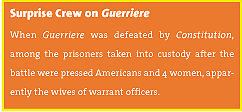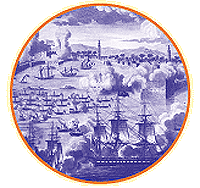
 |
 |

The boomerang cannon ball
After the battle with Guerriere, Moses Smith, an ordinary seaman on board Constitution, recorded the following incident in his diary :
“We came so near [Guerriere]... that an 18-pound shot came through us ..., striking just abaft of the breech of the gun to which I belonged. The splinters flew in all directions; but no one was hurt. We immediately picked up the shot, and put it in the mouth of the long Tom, a large gun loose on deck — and sent it home again, with our respects.”
| “...to the Shores of Tripoli”
| A Suspicious French Accent If your students know French, they might have noticed that the name Guerriere has a French ring to it. They are right. Guerriere, which means warrior, was captured from the French by the British in 1806. The custom at the time was to retain the original name and to continue to use it for later ships, as if the right to use the name had been captured along with the ship. |

|
Does History Repeat Itself? | Pity the Beleaguered Dey of Algiers
You might challenge the class to interpret the Dey’s message. What did he mean by “the want of other prizes?” Did he want to reach an agreement with the Americans? |
|
| |
| The attack made on Tripoli on August 3rd, 1804 John B. Guerrazi, 1804 USS Constitution Museum, Boston |

 |

